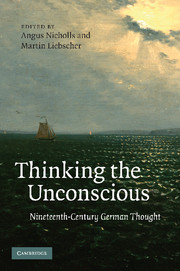Book contents
- Frontmatter
- Contents
- Notes on contributors
- Introduction: thinking the unconscious
- 1 The unconscious from the Storm and Stress to Weimar classicism: the dialectic of time and pleasure
- 2 The philosophical significance of Schelling's conception of the unconscious
- 3 The scientific unconscious: Goethe's post-Kantian epistemology
- 4 The hidden agent of the self: towards an aesthetic theory of the non-conscious in German romanticism
- 5 The real essence of human beings: Schopenhauer and the unconscious will
- 6 Carl Gustav Carus and the science of the unconscious
- 7 Eduard von Hartmann's Philosophy of the Unconscious
- 8 Gustav Theodor Fechner and the unconscious
- 9 Friedrich Nietzsche's perspectives on the unconscious
- 10 Freud and nineteenth-century philosophical sources on the unconscious
- Epilogue: the “optional” unconscious
- Works cited
- Index
- References
4 - The hidden agent of the self: towards an aesthetic theory of the non-conscious in German romanticism
Published online by Cambridge University Press: 04 August 2010
- Frontmatter
- Contents
- Notes on contributors
- Introduction: thinking the unconscious
- 1 The unconscious from the Storm and Stress to Weimar classicism: the dialectic of time and pleasure
- 2 The philosophical significance of Schelling's conception of the unconscious
- 3 The scientific unconscious: Goethe's post-Kantian epistemology
- 4 The hidden agent of the self: towards an aesthetic theory of the non-conscious in German romanticism
- 5 The real essence of human beings: Schopenhauer and the unconscious will
- 6 Carl Gustav Carus and the science of the unconscious
- 7 Eduard von Hartmann's Philosophy of the Unconscious
- 8 Gustav Theodor Fechner and the unconscious
- 9 Friedrich Nietzsche's perspectives on the unconscious
- 10 Freud and nineteenth-century philosophical sources on the unconscious
- Epilogue: the “optional” unconscious
- Works cited
- Index
- References
Summary
The novels and poems come unwatched out of one's pen.
D. H. LawrenceThe phenomenology of introspection
One significant part of the romantics' legacy was their awareness of layers beneath human consciousness and the desire to explore them. Studying the ways in which many romantics approached this counterfoil to consciousness, or “night side of science” as one of their key proponents called it, amounts to describing the emergence of a theory. Yet the usage of the word “theory” requires some qualification, for all the tentative or emphatic references to the sub-conscious in romanticism resembled an attempted mapping out of unknown territory, consisting of assumed inner landscapes of boundless expansiveness but necessarily without much empirical data to support this undertaking. The fact that the romantics insisted on exploring this sphere by means of what were deemed dubiously pseudo-scientific methods has given critics sufficient grounds for questioning what they saw as the blunt expression of irrationality by mostly poetically minded intellectuals.
What those critics did not appreciate was the romantics' main presupposition: namely, that there is a non-rational area of human existence with its own logic and pronounced forms of, at times erratic, expression. The romantic project of exploring the non-conscious or sub-conscious stretched, incidentally, from some notes by the poet-philosopher Friedrich von Hardenberg (otherwise known as Novalis, 1772–1801) on psychological phenomena, to Marie von Ebner-Eschenbach's (1830–1916) late romantic novella in the shape of correspondence cards, Die Poesie des Unbewussten 1883 (The Poetry of the Non-conscious), which, ironically, refuses to differentiate between consciousness and non-consciousness.
- Type
- Chapter
- Information
- Thinking the UnconsciousNineteenth-Century German Thought, pp. 121 - 139Publisher: Cambridge University PressPrint publication year: 2010
References
- 1
- Cited by



